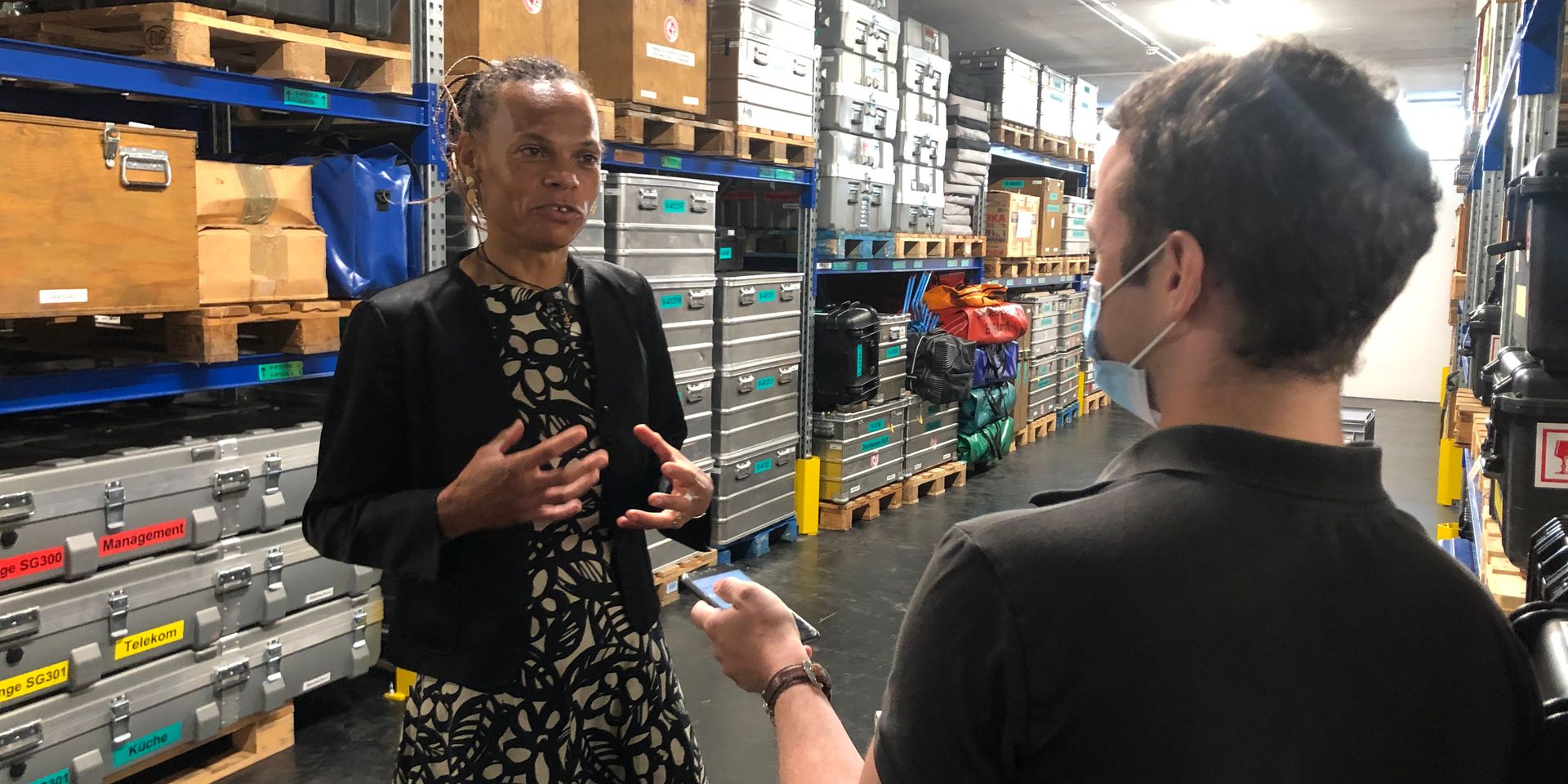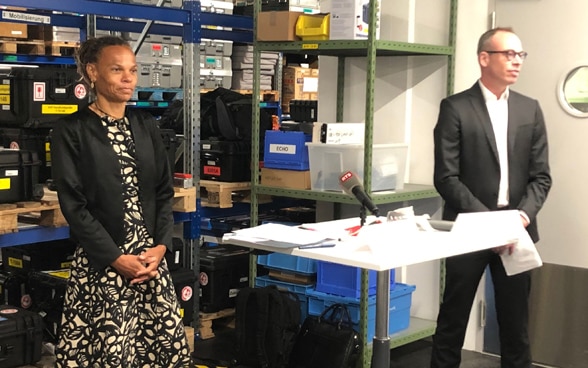Patricia Danzi, Director of the SDC: "I experience an enormous solidarity"
During a media conference on Monday, 27 July 2020, Patricia Danzi reviews her first 100 days as director of the SDC. At the Humanitarian Aid depot in Wabern, she looks back on her arrival in the midst of a global pandemic and stresses the importance of support on site - a partnership that will continue to flourish even after the crisis.

Almost 100 days in office: The director of the SDC, Patricia Danzi, talks about COVID-19, Switzerland's international cooperation and the importance of being present on site. © FDFA
It is May 1st, 2020 when Patricia Danzi takes up her position as Head of the Swiss Agency for Development and Cooperation (SDC) – in the middle of the COVID 19 crisis. "I was given a warm welcome by my boss, but also by my colleagues in Bern and in the field offices. But of course it was a strange feeling to experience the SDC building almost empty, not being able to travel to the affected areas myself," says Patricia Danzi. It was therefore very important to ensure communication with the people on the ground: "They provide support on site, they are present wherever Swiss aid is delivered." In addition, bilateral and multilateral exchanges have been intensive in recent weeks as well, albeit mostly digital, according to the new director of the SDC.
The COVID 19 crisis has also highlighted the importance of rapid and flexible development cooperation. "Switzerland has reacted quickly and unbureaucratically. Within a very short time, we were able to provide additional help and support on the ground. I experience enormous solidarity and a great deal of interest in Switzerland's international cooperation," stresses Patricia Danzi.
Fighting poverty and promoting the rule of law
Switzerland's commitment abroad is of concern to the Federal Department of Foreign Affairs (FDFA) and its Department for Development and Cooperation (SDC) not only in connection with the current coronavirus but also in the context of the elaboration of the international cooperation strategy (IC 2021–2024). The IC strategy is currently being debated in Parliament: in the summer session, it was passed by the National Council, and in the autumn session in September, the Council of States will address the issue. If the Council of States also approves it, the strategy will be implemented as of 2021.
A priority for the new director of the SDC: "We want to fight poverty by creating local jobs and promoting the economy. In addition, the COVID 19 crisis clearly shows how important it is to have functioning systems based on the rule of law. We want to strengthen these systems and thus promote respect for human rights and international governance," emphasizes Patricia Danzi. Finally yet importantly, the fight against climate change plays a central role. "After all, it is the developing countries that are particularly hard hit by the consequences of the climate crisis. Hunger, war and lack of economic prospects are the main reasons for flight and migration."
Switzerland's interest in a stable international order
The IC Strategy 2021–2024 will make development cooperation more focused and thus even more effective. It is based on the criteria of the needs of the local population, the long-term interests of Switzerland and the added value of Swiss cooperation in international comparison. "We have a solid mandate, based on our constitution, which places the needs of the people and the fight against poverty at the center. Switzerland is a globally networked country and as such we have an interest in a peaceful and equitable international order, economic conditions and sustainable development worldwide. At the same time, Switzerland can make an important contribution in these areas thanks to its expertise, innovation and good offices," emphasises Patricia Danzi.
When it comes to implementation, it is then crucial to be able to count on partners. These include regional institutions as well as national and international non-governmental organizations and the world of business. "The private sector can do something we cannot do: create local jobs and boost the economy. It is a fact that in our partner countries, 80 to 90 percent of the workforce is employed in the private sector. The involvement of the Private Sector is therefore central if we want to fight poverty in the regions in a sustainable manner," explains Patrica Danzi.
Direct contact creates mutual trust on site
The IC strategy is designed to ensure that Switzerland's international cooperation can be flexibly adapted to new challenges. "The strategy has various mechanisms at its disposal to enable us to respond specifically to events such as natural disasters, wars or a global pandemic. Such flexibility is likely to become increasingly important in the future, given that the needs in the affected regions are changing rapidly," says the director of the SDC. "As a small country, Switzerland has great multilateral weight and has humanitarian aid that can respond quickly and efficiently. The trust we experience on site is our greatest asset," says Patricia Danzi.
A trust that is based on years of cooperation and one that stands out especially in difficult situations. "Particularly during the COVID 19 crisis, many countries called on their local staff to come home. Switzerland has decided to stay on site and accompany the local people when they need it most. Switzerland is present and can make a difference in emergency situations. This commitment creates trust and is not easily forgotten."
After her first 100 days in office, the new director of the SDC is particularly looking forward to experiencing this trust and the work of Switzerland's international cooperation live on side.
IC strategy 2021–2024
The IC strategy is a foreign policy tool of Switzerland, based on the Federal Constitution, to alleviate need and poverty worldwide, improve the observance of human rights, promote democracy and protect the environment. The following thematic priorities are set for the years 2021–2024:
- the creation of decent jobs on the ground
- the fight against climate change
- the reduction of the causes of flight and irregular migration
- the commitment to the rule of law
The Federal Council wants to improve the impact of IC through these four thematic priorities, geographical focus, innovation and the use of digital technologies. In addition, the reorientation will enable a more flexible response to crises and opportunities. The Federal Council defined the thematic and geographical priorities for the next four years in February. In the 2020 summer session, the National Council approved the business, and in the 2020 autumn session the Council of States will address the strategy. More about Switzerland's IC strategy




